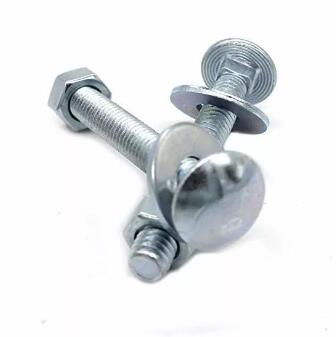Exploring the Nuts and Bolts: Common Materials Used in Bolt Manufacturing
2023-11-20
Introduction
In the world of construction, engineering, and manufacturing, bolts play a crucial role in holding things together. These seemingly small components are the unsung heroes of various structures, ensuring stability and reliability. However, not all bolts are created equal, and the choice of materials can significantly impact their performance. In this blog post, we'll delve into the common materials used to make bolts, exploring their unique properties and applications.
1. Carbon Steel Bolts: The Workhorse of Construction
Carbon steel bolts are among the most widely used in construction and engineering projects. They are cost-effective, strong, and versatile. The carbon content in these bolts gives them their strength, making them suitable for a range of applications, from building bridges to assembling machinery. Carbon steel bolts are also known for their durability, though they may be susceptible to corrosion over time.
2. Stainless Steel Bolts: Corrosion-Resistant Champions
When corrosion resistance is a top priority, stainless steel bolts come to the forefront. Comprising iron, chromium, nickel, and other elements, stainless steel bolts resist rust and corrosion, making them ideal for outdoor applications and environments with high moisture levels. They are commonly used in marine and coastal construction, as well as in the production of household appliances.
3. Alloy Steel Bolts: Strength with Added Toughness
Alloy steel bolts are engineered to provide enhanced strength and toughness compared to carbon steel. By alloying steel with other elements like chromium, molybdenum, or vanadium, manufacturers create bolts that can withstand higher stress and impact loads. This makes alloy steel bolts suitable for applications where standard carbon steel bolts might fall short, such as in heavy machinery or automotive components.
4. Brass Bolts: Aesthetic Appeal and Corrosion Resistance
Brass bolts are chosen not just for their mechanical properties but also for their aesthetic appeal. Composed mainly of copper and zinc, brass bolts have a distinct golden hue that makes them popular for decorative applications. Additionally, brass exhibits excellent corrosion resistance, making these bolts suitable for use in environments where exposure to moisture is a concern.
5. Titanium Bolts: Lightweight Strength
In situations where weight is a critical factor, titanium bolts shine. Titanium is known for its exceptional strength-to-weight ratio, making it a preferred material in aerospace and high-performance sports equipment. Though more expensive than steel, titanium bolts offer the advantage of being both lightweight and corrosion-resistant.
6. Aluminum Bolts: Lightweight and Corrosion-Resistant
Aluminum bolts are prized for their low density, making them exceptionally lightweight. This property, coupled with their corrosion resistance, makes aluminum bolts a suitable choice for applications where weight reduction is crucial, such as in automotive and aerospace industries. However, it's important to note that aluminum bolts may not have the same strength as steel or titanium bolts.
Conclusion
In the diverse landscape of bolt materials, each type brings its unique set of properties and advantages to the table. The choice of material depends on the specific requirements of the application, balancing factors such as strength, corrosion resistance, weight, and cost. As technology and materials science continue to advance, we can expect even more innovations in bolt manufacturing, further expanding the possibilities for construction, engineering, and beyond. Whether it's the sturdy reliability of carbon steel, the corrosion resistance of stainless steel, or the lightweight strength of titanium, bolts continue to be the unsung heroes holding our world together.



